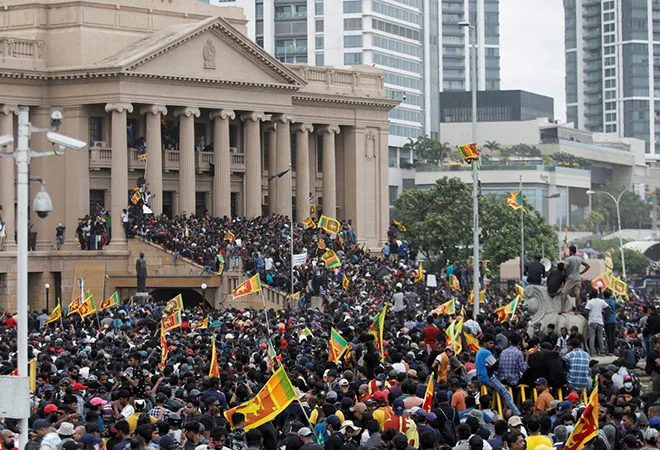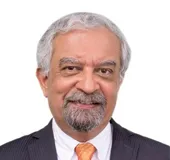
Sri Lanka was in civil war for decades. Despite this,
according to the UNDP’s report, it is globally ranked 72 out of 189 countries and is in the high human development category. Moreover, Sri Lanka has consistently maintained a global human development ranking of between 72-70 since 2010, far above all other South Asian countries, making the current crisis in Sri Lanka all the more tragic, given its catastrophic human development consequences.
This neighbouring country is currently suffering from the effects of an avoidable, explosive cocktail that even its impressive human development indicators cannot cushion. Its meltdown represents a critical moment in time providing an opportunity to gather and reflect on the myriad political and economic factors that led to this, and to draw lessons for governance in the region and the world.
Rajapaksas and the crisis
Early signs of the Rajapaksa leadership style trace back to 2009 when then Defence Secretary Gotabaya used brutal bombings to exterminate the Tamil Tigers with little regard for the lives of ordinary Tamil civilians. This further alienated Sri Lankan Tamils.
As with the Tamils, the ruthless response towards the Muslim community after the 2019 Easter Sunday bombings indicated disdain for minorities.
A respite from the Rajapaksa brothers in 2015
–16 was short-lived due to a weak and divided Opposition and election wins for Gotabaya (2019) and Mahinda (2020), further consolidating political repression. As with the Tamils, the ruthless response towards the Muslim community after the 2019 Easter Sunday bombings indicated disdain for minorities. It also showcased a strongman leadership style that used ethnic nationalism and fear as tools, which is supported by important segments of the Buddhist clergy and the majority Sinhala community.
Political nepotism, with appointments of at least four Rajapaksas in senior levels of the government, financial crimes, and suppression of dissent and the media were hallmarks of this period. The Rajapaksa’s absolute power led to a lack of consultation beyond a small inner circle, a lack of political, economic or social accountability, and inevitably poor policy making, resulting in the current meltdown.
The five most important government policies contributing to the current economic collapse include:
- Slashing taxes across the board, which seriously depleted state coffers in a nation with an already exceedingly low tax-to-GDP ratio
- Unwise foreign loan-dependent infrastructure projects with dubious economic returns which have contributed significantly to Sri Lanka’s crippling and unsustainable debt (eg. The Hambantota Port)
- A denial of the country’s massive external debt of US$ 51 billion of which US$ 28 billion is to be paid by 2027, and refusal to go early to the International Monetary Fund (IMF) for a rescue package
- The banning of imported chemical fertilisers in response to the country’s massive debt, forcing farmers to switch overnight to organic agriculture, causing the current food crisis and a dramatic reduction in foreign exchange earnings from tea, the main export
- The poor management of COVID-19, which led to the rampant spread of the virus and contributed significantly to dramatically reduced tourism-based revenues.
The Rajapaksa’s absolute power led to a lack of consultation beyond a small inner circle, a lack of political, economic or social accountability, and inevitably poor policy making, resulting in the current meltdown.
The impact of these policies combined with significantly lower diaspora remittances have seriously exacerbated Sri Lanka’s foreign exchange crisis, making it bankrupt, with paltry Central Bank reserves against a monthly requirement
of at least US$ 1 billion to enable imports of even limited amounts of fuel, fertiliser, food, medicine and basic necessities to address serious shortages. This also led to the country’s first-ever debt default in May 2022.
Key lessons
Good governance requires credible, non-corrupt statespersons. Leaders with a clear long-term vision who are willing to consult and accept dissenting views. It also requires strong checks and balances including a credible political opposition, independent and fearless judiciary, election commission, and media.
- Gotabaya’s departure indicates that no leader, however powerful or seemingly untouchable, is invincible. Indeed, the downfall of most autocratic leaders, especially in electoral democracies, often comes relatively quickly. This is particularly important to note at a time when such leaders appear to be on the ascendency in developed and developing countries, in democracies as well as one-party states, aided and supported by frustrated and ill-informed voters and populations. Their political tool kit typically includes many ingredients used by the Rajapaksas; a mix of centralised, non-consultative decision-making, a partisan government bureaucracy, weakening of independent institutions, control or self-censorship of large parts of the media, fake social media, and creation of divisions amongst the population using ethno-nationalist and/or religion-based populist propaganda and policies. Dr Ngaire Woods, Professor of Global Economic Governance at the University of Oxford, recently stated, “Leaders in positions of tremendous authority often wear blinders that can cause them to make profound mistakes…… another pitfall of the powerful (is) an unwillingness to seek counsel and countenance criticism… power often convinces its wielders that they are exceptional, that the rules don’t apply to them….power isolates leaders…”.
- Despite a growing feeling that populism based on religious ethno-nationalism is an effective political strategy that shields majoritarian leaders from poor economic performance, the Sri Lankan case shows clearly that extreme economic hardship is their ultimate Waterloo. High inflation or low GDP growth rates, or even a recession is not enough to propel change. There must also be a mix of extreme multi-faceted deprivation and immediate hunger confronting a sizeable percentage of the population. The extreme economic meltdown must negatively impact not just the poor and vulnerable minorities but also the middle class and the dominant religious-ethnic population. The loss of majoritarian support from Sri Lanka’s Sinhala Buddhist community in the last year appears central to the Rajapaksa downfall.
- A weak and divided political opposition, often less credible than the ruling autocrat, coupled with increasingly compromised judiciaries, election commissions and media, severely constrains genuine democratic practice since they can no longer be relied upon to maintain the institutional checks and balances they were established to ensure. They must all share in the blame for unaccountability and poor governance, not just in developing countries with less mature institutions, but also in many advanced democracies. In Sri Lanka, a weak political opposition further reduced its already limited credibility when it put up a resigned Rajapaksa cabinet member as its presidential candidate.
- In the absence of credible, effective opposition parties and institutions, people power movements often emerge. But despite the hope they clearly inspire, one should be less than sanguine about their ability and capacity to bring about sustained desirable political, social, and economic change. In the face of the formidable challenges, these movements can only provide an important beginning with their spontaneity, inspirational, organic nature and socio-ethnic mix which brings about an initial euphoria. Similarly, the Janatha Aragalaya by itself is unlikely to sustain desirable change, especially in the absence of any untainted, inspiring, broadly acceptable political leader. The new President and Prime Minister are closely entwined with the Rajapaksas, with both sides needing each other’s protection. A senior international crisis group consultant regards the ongoing crackdown on dissent by President Wickremesinghe to be worse than any under President Gotabaya, suggesting that the people of Sri Lanka have not even achieved any real change in the short term.
- An unintended and hopefully long-lasting benefit of the Sri Lankan Janatha Aragalaya will be the solidarity exhibited by Sri Lankan Christians, Muslims, Tamils and Sinhalese united fearlessly in fury and hope. If sustained and translated into a new social contract for the nation, this unity in adversity may well be the most important positive lesson of the Sri Lankan meltdown for the region and the world.
The views expressed above belong to the author(s). ORF research and analyses now available on Telegram! Click here to access our curated content — blogs, longforms and interviews.



 Sri Lanka was in civil war for decades. Despite this,
Sri Lanka was in civil war for decades. Despite this,  PREV
PREV


